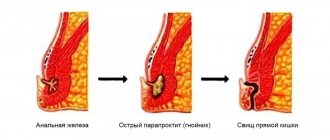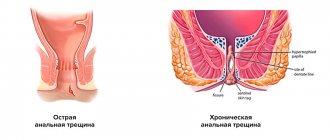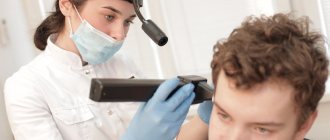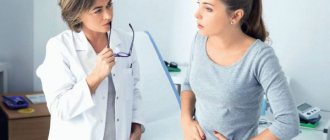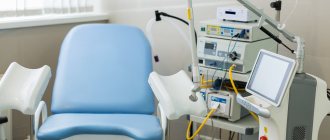Mucus is a thick, slippery substance that is produced in various human organs. In the intestines, it is needed to moisturize the mucous membrane and ensure the free passage of feces. Therefore, a small amount of mucus in the stool is not a cause for concern. But an increase in the amount of mucus, especially in combination with other symptoms, may indicate certain diseases of the digestive tract. Sometimes this is how malignant tumors manifest themselves.
- Causes of mucus in stool
- Symptoms to look out for when you have mucus in your stool
- What diseases cause mucus to appear in stool?
- In what cases should you consult a doctor?
- Examination for the appearance of mucus in the stool
What diseases cause mucus to appear in stool?
Irritable bowel syndrome is a functional disorder when there are no pathological formations in the intestine, but its functioning is disrupted. The main manifestation is constipation, diarrhea, or alternating between them. The appearance of such a symptom as mucus in the stool is also very typical.
Crohn's disease is a chronic inflammatory disease that can be severe and lead to the development of malignant tumors. The lesion can spread to all parts of the digestive tract - from the oral cavity to the rectum. At the same time, mucus is often present in feces.
Ulcerative colitis also belongs to the group of inflammatory bowel diseases and leads to the formation of ulcers on the mucous membrane. They bleed, secrete pus and mucus - all these impurities are present in the stool. Other characteristic symptoms of the disease: pain and cramps in the abdomen, diarrhea.
Proctitis is inflammation in the rectum. It develops as a result of various infections (including sexually transmitted infections), injuries, hemorrhoids, and inflammatory bowel diseases. Mucus in the stool is one of the characteristic symptoms.
Pseudomembranous colitis is a severe infectious disease that affects the rectum. It is caused by the microorganism clostridioides difficile, usually after the normal intestinal flora has been destroyed by antibiotics. Pseudomembranous colitis can cause severe, even life-threatening diarrhea, and the stool is foul-smelling and contains a lot of mucus.
Food poisoning usually manifests itself as flu-like symptoms, blood, and large amounts of mucus in the stool. It usually goes away within a few days, but in some cases it can be serious.
Intestinal infections and helminths can also lead to mucus in the feces.
Colon and rectal cancer. The leading symptom of the disease is blood in the feces. But mucus may also appear.
Anal fistulas or rectal ulcers . Ulcers are defects in the mucous membrane, and fistulas are pathological communications between the intestine and the surface of the skin. In both cases, the stool often has an unpleasant odor, and mucus is released in large quantities.
Allergic colitis most often occurs in young children as a reaction to cow's milk. In this case, feces often contain a lot of mucus.
Mucus secretion
The following intestinal pathologies can lead to such discharge:
:
- haemorrhoids;
- Crohn's disease;
- irritable bowel syndrome;
- anal fissures;
- fistula;
- neoplasms;
- proctitis;
- intoxication (usually the discharge is watery);
- herpes in the intestines;
- dysbacteriosis;
- peptic ulcer;
- condylomas, etc.
More often, mucus is released along with feces during bowel movements. However, there are also cases of discharge between trips to the toilet. This may be due to inflammation or low sphincter tone. In a number of pathologies, the mucus may have a pinkish tint, which indicates the presence of bleeding.
Examination for the appearance of mucus in the stool
To understand why mucus appears in the stool, the doctor may prescribe the following diagnostic methods:
- General blood analysis.
- Stool analysis is a coprogram.
- Analysis of stool for infections, helminth eggs.
- Fecal occult blood test.
- Colonoscopy is an endoscopic procedure during which the mucous membrane of the rectum and colon is examined using an instrument in the form of a thin flexible hose (colonoscope) inserted through the anus.
- Sigmoidoscopy is an endoscopic examination of the rectum and sigmoid colon.
- Endoscopic examination of the esophagus, stomach and duodenum.
- Video capsule endoscopy is an alternative to classical endoscopic examinations of the digestive tract. The patient is asked to swallow a small capsule containing miniature video cameras. This capsule will pass through the intestines, “inspect” its mucous membrane and leave the body naturally.
- CT, MRI.
Whatever disease causes mucus to appear in feces, it is better to diagnose it at an early stage. You can check the condition of your digestive organs using the comprehensive GIT program at the Euroonko clinic. This program includes all basic instrumental and laboratory diagnostic methods, as well as consultations with our leading medical specialists.
Book a consultation 24 hours a day
+7+7+78
Associated symptoms
Basically, various discharges are accompanied by other symptoms that accompany pathologies.
Among these symptoms
:
- itching and burning in the anus;
- blood in stool;
- pain in the anus or intestines;
- defecation disorders;
- weakness.
Specific symptoms of a particular pathology, combined with complaints about discharge, allow the doctor to make a primary diagnosis and prescribe additional diagnostic tests.
Intestinal candidiasis. Indications for examination
Indications for examination of the gastrointestinal tract to exclude fungal infection should be the following:
- the presence of 2 risk factors for the possible occurrence of candidiasis,
- double superficial colonization of candida,
- the presence of reasons that can lead to disruption of the microflora of the gastrointestinal tract with excessive growth of fungi of the genus Candida.
- febrile conditions of unknown origin, resistant to antibiotic therapy,
- skin and allergic diseases, because Candida is a trigger for allergic diseases and a factor favoring their development.
Algorithm for diagnosing intestinal microflora disorders with overgrowth of Candida flbicans:
- Analysis of medical history, identification of risk factors,
- analysis of clinical data,
- microbiological and gas chromatographic methods for studying disorders of the microflora of the intestinal tract (various biological environments),
- smears - impressions from the mucous membranes of the mouth and esophagus,
- if systemic candidiasis is suspected, it is necessary to culture blood and biological fluids and tissues for the presence of a fungal infection,
- serological diagnosis and assessment of the effectiveness of treatment based on the levels of antibodies to candida,
- inflammatory markers (lysozyme, a-antitrypsin, elastase),
- secretory immunoglobulin A, which allows assessing the degree of activity of the intestinal-associated immune system,
- immunological status (screening) level 1.
All laboratory data should be assessed and analyzed in conjunction with the patient's current clinical situation.
Prevention of tenesmus
Preventive measures for this pathology are as follows:
- high fiber diet;
- drinking enough clean drinking water;
- moderate physical activity;
- reducing stressful situations at home, at work, etc.
Not all patients benefit from a high-fiber diet. This preventive measure is very effective for false tenesmus, but is contraindicated in patients with Crohn's disease and ulcerative colitis. You should not take foods with a high fiber content in the following cases:
- period of exacerbation of chronic gastrointestinal disease;
- serious narrowing of the intestinal lumen.
Those people who are not prohibited from such a diet can alleviate their condition by eating:
- legumes;
- nuts;
- vegetables fruits;
- lentils;
- seeds;
- whole grains, etc.
Equally important is drinking water in an amount of at least 2-3 liters per day. This is important for normal and timely bowel movements. Moderate physical activity and sports help improve digestion, restore intestinal motor function and eliminate false urges to defecate.
It is important to maintain a calm state of mind in any situation, as the intestines (and stomach) are very sensitive to stress. For this, relaxation methods, meditation, yoga, psychotherapy, etc. are used.
When you urgently need to call an ambulance
An ambulance should be called if intestinal obstruction is suspected. That is, in addition to tenesmus, a person has symptoms such as the inability to empty the intestines for a long time, severe and cramping pain, or slowly increasing pain in the intestines. The symptoms are also dangerous if the patient has vomiting, frequent tenesmus with blood and there is no discharge of gases or feces even after enemas.
Before the ambulance arrives, you should put the person on the bed, apply cold to the stomach and not give any food. In this condition, the patient should not take painkillers and laxatives. You should also not apply a heating pad to your stomach.
What is mucus
The human body is very clever. It provokes a constant secretion of mucus in order to protect tissues and organs. Mucus is a jelly-like substance that is whitish, light orange, green or brown, or completely transparent. Formed during the secretion of intestinal glands.
Some of the mucus consists of epithelial cells and leukocytes. This dense secretion has an important role in the body: it protects the intestinal walls from the effects that toxic components of feces can have on it. White mucus is also a way to protect the intestines from mechanical effects caused by coarse dietary fiber. The secret helps prevent constipation, which is explained by difficulties in passing feces.
Causes of mucus from the anus. An adult body produces mucus constantly. It is also considered normal that the viscous contents of the intestines are constantly excreted. This is a guarantee of facilitating the movement of feces to the anus. The answer to the question of why constipation occurs can be simple: a lack of mucus slows down the process.
Constipation
If the process of inflammation begins in the intestines, then the removal of natural lubrication becomes more difficult. Its absence is the cause of anal fissures, hemorrhoids, and bleeding. Pathologies can also develop in case of excessive mucus production.
Important! In any case, you should always pay attention to the color of stool and its structure. If you suspect any violations, you should immediately consult a doctor.
Diet for diarrhea
Diet is one of the components of treatment. Since with any diarrhea there is irritation (and often severe inflammation) of the intestinal mucosa, food should be as gentle and easily digestible as possible. For diarrhea it is recommended:
- drink more (drinks at room temperature, warm), the preferred drinks are simple drinking water, water-salt mixtures, warm tea, weak jelly, astringent and enveloping herbal teas and infusions. Alcohol, milk, fruit juices, carbonated drinks should be avoided;
- do not eat if you have no appetite (this is a protective reaction of the body);
- When you have an appetite, you can start with secondary broths, oatmeal or rice porridge (in water), dried white bread, mashed potatoes, boiled lean meat (a little, pureed). Then you can try boiled and baked vegetables and fruits. Food should be semi-liquid, homogeneous, it should be taken often and little by little;
- Until stool is completely normalized (and preferably for some time after), fresh fruits and vegetables, as well as alcohol, fatty, spicy and fried foods should be avoided.
Treatment
If a person experiences tenesmus, treatment is prescribed depending on the causes of the pathology, the severity of the condition, etc. It is very important to correctly determine the cause of the phenomenon. If a patient has colorectal cancer, it is better to detect it as early as possible. For this disease, complex treatment is prescribed, which includes a variety of techniques. It is also necessary to begin treatment for inflammatory diseases of the gastrointestinal tract as soon as possible. Early diagnosis of these pathologies is the key to successful treatment results.
At the appointment, the doctor will draw up a complete picture of the occurrence of the disease. The survey may include the following activities:
- blood tests;
- colonoscopy;
- bacterial culture of stool;
- CT scan of the abdominal region;
- screening for sexually transmitted diseases.
The treatment regimen will depend on what particular pathology caused intestinal tenesmus. If the cause of tenesmus in adults is an inflammatory disease of the gastrointestinal tract, then the treatment regimen will be the same. For infectious diarrhea, completely different methods are already used, etc.
Diagnostics
A proctologist deals with intestinal diseases. Already at the first appointment, the specialist is able to identify one or another cause of discharge from the anus. However, collecting anamnesis and digital examination is not enough for a comprehensive and accurate diagnosis.
Therefore, the proctologist may additionally prescribe the following types of studies:
:
- instrumental examination;
- stool tests;
- blood tests;
- endoscopic examination of the intestine;
- X-ray of the abdominal cavity and intestines;
- Ultrasound.
Answers to some popular questions
Many people are interested in the question of what urinary tenesmus is. Tenesmus is a false urge to defecate or urinate. Therefore, there are intestinal false spasms, and there is also bladder tenesmus. Accordingly, with such spasms, a tonic contraction of the muscles of the rectum or bladder occurs. Spasmodic contraction of the sphincters may also occur simultaneously. In both cases, false spasms do not allow either the intestines or the bladder to empty, that is, they are ineffective. Such phenomena are uncomfortable and may be accompanied by severe pain.
Another popular question from patients is: how to get rid of tenesmus? The success of treatment depends on correct diagnosis. The speed of the patient’s recovery will depend on how quickly and correctly the doctor determines the cause of the pathology. In cases where false urges cause tumors in the rectum, inflammatory, infectious diseases in the gastrointestinal tract, treatment should be started as early as possible. Then the result of therapy will be positive, and the process of recovery from the disease will take less time. Therefore, at the first symptoms of tenesmus, you should not hesitate, but get examined in a professional clinic.
Intestinal candidiasis. Therapy
Therapeutic approaches to the treatment of gastrointestinal dysbiosis with overgrowth of Candida fungi include the following:
- A balanced diet excluding sugar and the consumption of complex carbohydrates, foods with prebiotic properties, and probiotic foods.
- Antifungal drugs.
2.1.Polyene antibiotics (nystatin, natamycin, levorin).
- Nystatin is most appropriate to use in the presence of candida in the esophagus, stomach and is practically ineffective when candida is localized in the intestine, which makes it also not effective when administered prophylactically along with antibiotic treatment.
- Pimafucin (natamycin) is the most effective drug for overgrowth of Candida in the intestines. The drug has an antifungal (fungicidal) effect. Interacts with sterols in fungal cell membranes, disrupting their structure and function and causing their death. Active against many pathogenic yeast fungi, especially Candida albicans. No resistance to natamycin was observed. For intestinal candidiasis, 1 tablet is prescribed. 4 times a day after meals for 7-10 days.
2.2. Triazole derivatives (flucanazole, Diflazon, Diflucan, Mikosist, Flucostat, rumicosis, intraconazole, terbizil, etc.), caspofungin derivatives - Cancidas (for administration of the drug), Noxafil (posaconazole) suspension for oral administration.
2.3. MPH (copper derivative of chlorophyll) is a plant antiseptic from brown algae, a natural immunomodulator due to stimulation of phagocytosis and the activity of copper cations, enhanced by the influence of alcohol, has a bactericidal effect against staphylococci, streptococci, pneumococci, fungi, putrefactive bacteria and E. coli and an antiviral effect. MPH protects and stimulates hematopoiesis, the anti-inflammatory effect is due to an excellent complex of microelements. Prescribed by a doctor orally, 1 drop per 5 kg of body weight daily in a small amount of water. The course of treatment is 30 days,
2.4. Citrosept is a herbal antimicrobial agent made from grapefruit seed extract, which has a bactericidal effect, including. and against fungi of the genus Candida and Helicobacteriosis of the stomach, promotes the absorption of vitamin C, contains bioflavonoids that strengthen the vascular wall of capillaries and prevent blood clots and cholesterol plaques, stimulates the body's natural resistance. It is prescribed as drops diluted in water or juice in different dosage regimens depending on the disease.
2.5. Self-eliminating bacillary preparations (B subtilis, L.bulgaricus) - Flonivin-IS, Baktisubtil, Sporobacterin, biosporin, Baktisporin, Gastrofarm, etc.
2.6. Saccharomyces boulardi - Enterol, 1 capsule contains 250 mg Saccharomyces boulardi, suppresses the growth of opportunistic flora and fungi Candida Krusei, Candida pseudotropical
2.7. Probiotics – lactose-containing preparations (Lactobacterin, Gastrofarm, Primadophyllus, Acidophyllus, Narine, etc.)
- Enterosorbents.
- Hepatoprotectors (Heptral, Hofitol, Karsil, milk thistle preparations, Floravit, etc.)
- Immunomodulatory drugs (Kipferon, Polyoxidonium, Dopolan, Marispan, etc.)
Treatment at home
Illnesses that produce false urges to defecate can often be treated at home. However, it should be noted that any use of medicines, including traditional medicine, must be agreed with the attending physician. For example, in addition to the main treatment, the patient is also prescribed auxiliary phytotherapeutic agents at home.
Let's give examples. To achieve temporary relief of the patient's condition, baths with herbal decoctions are sometimes prescribed. Enemas using sea buckthorn and rosehip (for ulcerative colitis) are often used. With dysentery, painful symptoms are eliminated by bed rest, a special diet, drinking plenty of fluids, and taking medications prescribed by a doctor.
How is the child examined?
In most cases, diarrhea with mucus does not require any specific examination7. The doctor assesses the child’s condition, examines him and, based on this, makes recommendations for treatment. To distinguish infectious causes of mucous diarrhea from non-infectious ones, the pediatrician prescribes laboratory tests and instrumental research methods4,7.
For a correct diagnosis, you should inform the doctor about the child’s eating habits, recently taken medications, and a tendency to allergies2.
Up to contents
